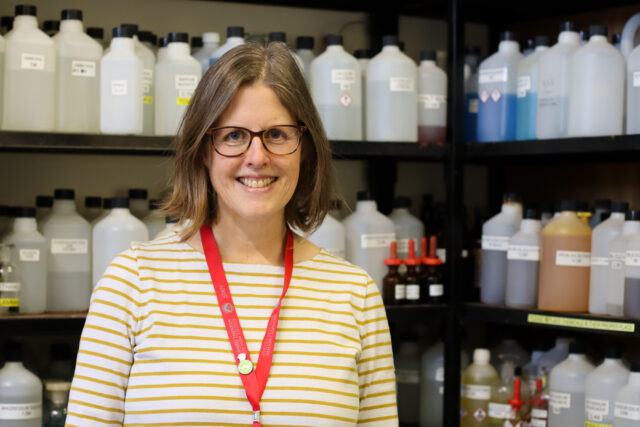As part of National Careers Week 2023, and to celebrate International Womens Day, we spoke to Chemistry teacher, Rachel Powell, about her career in STEM.
What is your job role at Richard Taunton Sixth Form College?
I am a Chemistry teacher and also teach some Biology and Health and Social Care. I am also the Pathway Lead for Physical and Built Environment. I joined Richard Taunton Sixth Form College in 2016 and before that worked at Applemore College Secondary School from 2012 to 2016, after re-training as a science teacher.
Tell us about your Education and previous careers
I did A levels in Chemistry, Biology, Maths and Further Maths and then went to Cambridge University to study Natural Sciences, but I ended up specialising in Chemical Engineering, so my degree is a Masters degree in Chemical Engineering.
I worked in an oil refinery (Fawley Refinery, near here!) for ten years at the start of my career. I did loads of different jobs there – they tend to swap you over into different roles at the start of your graduate career so that you get a feel for different roles. The roles I did were:
Design Engineer – I was involved in designing minor improvements to various different parts of the process, so I had to find out all about the existing process and then work out how to fit in the new parts.
Plant Performance Engineer – I was involved in troubleshooting problems and working out how to optimise the performance of the area I worked in. Highlights of this included crawling through reactors and fractionating columns when they were shut down for maintenance and cleaning, to make sure they were undamaged and still fit for purpose.
Core Supervisor – I was responsible for line managing a team of First Line Supervisors who each ran a shift of 5 or so process operators. I was accountable for safety and environmental performance of that part of the refinery.
Jet and Distillate Scheduler – I worked out how much jet fuel and distillate (diesel, mainly) the refinery was due to produce over the coming weeks/months and made sure we had enough tanks to store it in, or pipelines and ships to export it in.
Refinery Economist – I was responsible for running a computer programme that optimised the way that the refinery processes should be set up to make the most profit from the crude oil that we had bought.
Key skills gained through my industrial experience (and teaching!)
- Teamwork
- Problem solving
- Communication
- Decision making

How did you gain an interest in STEM, and what industry did you want to pursue?
I loved Science and Maths at secondary school and sixth form college, and originally wanted to go into biochemistry because I loved learning about biological processes at a molecular level. However, at university I found out about Chemical Engineering, which I’d never really heard of before, and it sounded like a great career to go into, blending science and maths and applying it to vital processes such as the manufacture of food and pharmaceuticals, water treatment and providing energy.
do you think it is important to get more students, including females, interested in STEM education?
It is crucial to get more students, including females, interested in STEM! There are so many exciting careers ahead for students with a STEM background. A background in STEM will enable students to play a part in solving some of the great challenges that face humanity, including climate change mitigation and adaptation, providing clean water and food for a growing population, technological revolutions such as the increasing use of AI, and so much more.
Who is a woman that inspires you, and why?
Any woman who has been a pioneer in their field really inspires me, like Katherine Johnson who was a Black female NASA Space Scientist in the 1950s (featured in the amazing film Hidden Figures) and also Rosalind Franklin – many people can name Watson and Crick as the creators of the double helix model of DNA, but far fewer know that it was Rosalind Franklin’s X-ray crystallography photos in the early 1950s that led to their discovery.
What inspirational message or advice would you give to young girls interested in a career in STEM?
STEM subjects will open up a world of opportunities for you, and allow you to develop skills and knowledge that you will be able to use to make a real difference in the world. You’ll learn to be creative in solving problems, and collaborate with others, which are skills that will be useful wherever your career takes you.